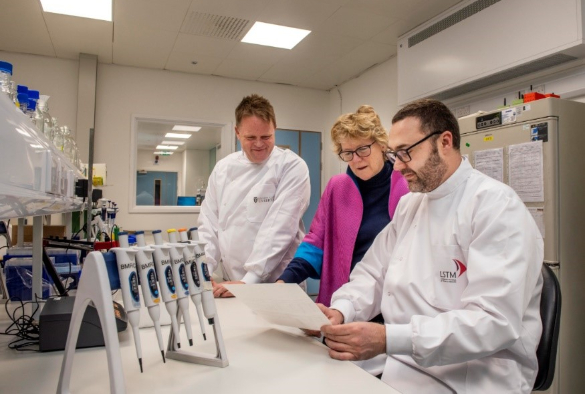World Antimicrobial Awareness Week: Liverpool research leading the way
Published on

Today marks the start of World Antimicrobial Awareness Week, which aims to increase awareness of global antimicrobial resistance (AMR) and encourage best practices among the general public, health workers and policy makers to avoid further emergence and spread.
Despite the global pandemic, it’s been a busy year for antimicrobial resistance research in Liverpool as our scientists continue to help address one of the greatest threats to human and animal health.
From the opening of dedicated state-of-the-art laboratories, to the discovery of fundamental new insights and the development of novel treatments, we round up our AMR research news highlights from the past 12 months.
AMR laboratories
Former Chief Medical Officer and current UK Special Envoy on Antimicrobial Resistance, Professor Dame Sally Davies visited Liverpool in January to help launch an ambitious new programme of AMR research for the Centre of Excellence in Infectious Diseases Research (CEIDR).
During her visit, Dame Sally unveiled a plaque marking CEIDR’s new £3.5m National Institute for Health Research (NIHR) Antimicrobial Resistance Laboratories, which provide the infrastructure needed for researchers to develop personalised antimicrobial therapies to prevent and treat AMR. Read more.
Clinical trials
Liverpool researchers carried out vital preclinical work for the clinical trial of a tablet form of the powerful new antibiotic tebipenem, which recently reported positive results in patients with complicated urinary tract infections.
Tebipenem could replace current intravenous antibiotic injection treatments and allow hard-to-treat patients to be cared for in the community, rather than in hospital. Professor William Hope and his Antimicrobial Pharmacodynamics and Therapeutics group studied tebipenem for approximately 3 years to provide the necessary in vitro and in vivo data for Spero Therapeutics that enabled their clinical study to proceed. The dose of tebipenem used in the trial (600 mg q8h) was defined by Liverpool’s work. Read more.
Killing mechanism
Researchers took a step forward on their quest to develop a viable drug based on teixobactin – a new class of potent natural antibiotic capable of killing superbugs. Dr Ishwar Singh and colleagues revealed fundamental new insights into how teixobactins kill bacteria, which could help inform the design of improved teixobactin-based drugs.
Dr Singh, an expert in Antimicrobial Drug Discovery and Development and Medicinal Chemistry, has led pioneering research over the past six years to develop teixobactin-based viable drugs, including the creation of simplified synthetic forms of teixobactins effective in treating bacterial infections in mice. Read more.
Evolution and spread
Researchers gained new insight into how antibiotic resistance evolves and spreads in Pseudomonas aeruginosa - one of three top priority pathogens that the World Health Organization deems as “critical” for new antibiotics to target.
A genomics study by Professor Craig Winstanley and colleagues identified a family of plasmids responsible for spreading multidrug resistance in P.aeruginosa on a global scale since as far back as the 1970s. Using a ‘third-generation’ genome sequencing technique called long-read sequencing, the researchers were able to characterise an emergent family of ‘megaplasmids’ contributing to the spread of multi drug resistance in P. aeruginosa in a hospital in Thailand. Read more.
Better use of antibiotics
Researchers launched a new £2 million study looking at use of antibiotics in sepsis and whether they are being oversubscribed, which experts cite as a significant factor leading to increasing antimicrobial resistance.
The PRONTO trial is being led from Liverpool by Professors Neil French and Enitan Carrol and aims to assess whether the addition of a point-of-care blood test can aid clinicians in their decision-making around the requirement for urgent antibiotic treatment in patients presenting to the emergency department with suspected sepsis. Read more.
‘Radically different’ treatment
Liverpool joined a new European consortium research project to develop novel treatments against drug-resistant bacterial respiratory infections.
Funded by Horizon 2020 and led for Liverpool by Professor Aras Kadioglu, the €3.5 million ‘Light4Lungs’ project is aiming to develop a novel therapeutic strategy for the treatment of AMR infections using targeted photodynamic therapy (PDT), which uses the combined action of light, oxygen and a photosensitive organic compound to destroy antibiotic resistant bacterial cells. Read more.
Government investment
The University became part of a major government-backed consortium project to deliver integrated therapeutic solutions for human infections. Supported by investment from UK Research and Innovation’s flagship Strength in Places Fund (SIPF), the University is hosting two of eight new specialist research platforms in North West England.
Professor William Hope is leading a platform to establish more clinically relevant animal models for use in the early development of new antibiotics, while Professor Rasmita Raval is leading a platform to accelerate the discovery and development of anti-infective surfaces. Read more.
World Antimicrobial Awareness Week runs from 18-24 November 2020.
Visit the Centre of Excellence in Infectious Diseases Research website to learn more about our mission to minimise the impact of infectious diseases and antimicrobial resistance on human health in Liverpool, the UK and globally